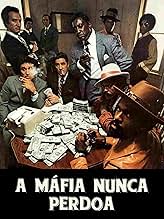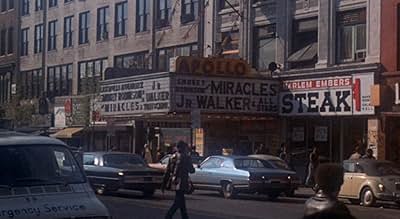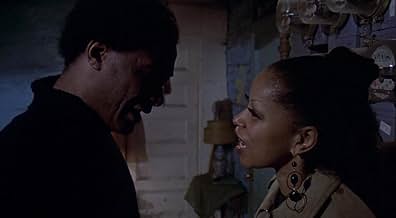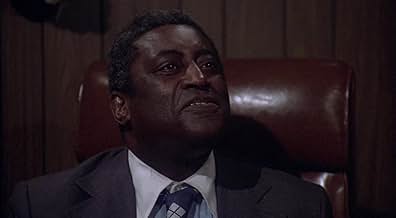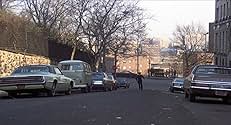IMDb रेटिंग
7.0/10
7.9 हज़ार
आपकी रेटिंग
अपनी भाषा में प्लॉट जोड़ेंTwo New York City cops go after amateur crooks who are trying to rip off the Mafia and start a gang war.Two New York City cops go after amateur crooks who are trying to rip off the Mafia and start a gang war.Two New York City cops go after amateur crooks who are trying to rip off the Mafia and start a gang war.
Joseph Attles
- Mr. Jessup
- (as Joe Attles)
Anthony C. Cannon
- Sal
- (as Anthony Cannon)
George DiCenzo
- Patrolman
- (as George Di Cenzo)
फ़ीचर्ड समीक्षाएं
Unlike in most reviews there are to find on "Across 110th Street", I will try not to participate in the debate about whether or not the film classifies as a genuine Blaxploitation effort. I will, however, elaborate as much as I can on all the things that "Across 110th" does represent
and that is quite a lot! This is a bona fide gritty, vile, uncompromising and unceasingly violent action-thriller from the glorious early 70's. It's a hardcore-to-the-bone tale of corruptness and survival with solid acting performances and a tight screenplay, yet without pushy morality lessons or unnecessary sentimental interludes. "Across 110th Street" is arguably the best Blacks Vs Italians thriller ever made, and this intervened with a strong story about two completely unmatchable cops that are forced to work together results in an unimaginably powerful and unforgettable movie; albeit one that only can be enjoyed by people with strong stomachs and nerves of steel as the bloodshed is relentless and the level of suspense is unremitting. Petty thief Jim Harris and his two accomplices decide to steal a large sum of money from the Italian Mafiosi that are running the show in Harlem. The heist goes terribly wrong, though, and Harris kills no less than five gangsters and two police officers. The Italians send their most lethal psychopath to Harlem and the black gangster community organizes their own manhunt as well. Meanwhile the police force deals with internal racial issues. The aging and corrupt but veteran Captain Mattelli is forced to hand over the investigation to Lieutenant Pope, who's fresh out of university and still full of ideals. This is one of the grittiest and frighteningly realistic depictions of the crime-infested New York City district during the early 70's. There are hardly any amiable characters in the entire film, the ambiance is constantly on the verge of depressing and the downbeat ending comes a massive slap in the face. The racial tension between the "main" police officer characters is always present and noticeable, yet moral values and speeches are never shoved down the viewers' throats. The performances are incredible, particularly Anthony Franciosa as the crazed mafia killer and Paul Benjamin as the small thief turned murderer. But the utmost respect is for Anthony Quinn, for courageously illustrating a dismal and raw cop-character with his status in Hollywood. The soul soundtrack is amazing and the actual Harlem filming locations make the film all the more authentic. Barry Shear's direction is surefooted and tight, and I can't believe I haven't checked out some of his other work yet. I still have a copy of "The Todd Killings" lying around, so I hope it's as masterful as this film!
"Across 110th Street" was more than just a cliché (yet it was full of them), it was deep and developed (yet had a simplistic story about cops and criminals), it was gritty and honest (yet overly-so enough to make you gasp, not laugh), and it was pure, uncut, cinematic genius from beginning to the wildly unseen ending. There were plenty of pitfalls for "Across 110th Street" to fall into, but it continually saved itself by being genuine and dark throughout. While the editing, albeit pure 70s cinema, was completely tangent, the film itself demonstrated the raw force of truth, giving us a rare (yet fictional) story of the changing of the guard in Harlem, the truth of its streets, and the minds of its criminals.
Sounding like a scene right out of "Dead Presidents", our story begins with three African Americans stealing money from the mob, only to transform the simple robbery into a battleground, equipped with machine gun fire and plenty of cops caught in the line of fire. Needless to say, both sides the Italian mob who currently has a strong hold on the crime in Harlem as well as both the upcoming African American police Lieutenant (played by Yaphet Kotto) and the decaying corrupt Captain (played by Anthony Quinn) are ready to do whatever it takes to bring these men to justice. Our plot device suddenly becomes a ticking clock, with our minds in constant question as to who is going to get to the finish line first. What keeps this cliché device from sounding stale is director Barry Shear's ability to take us through each of the three story lines with nobody eating from the sweet cake of victory at any given time. "Across 110th Street" is not a comfortable story. The characters are flawed, the imagery is sandpaper rough, and the language is honest. Shear has made this film during a time where corruption is used to represent the mindset of the community. Harlem is not shown in a productive light, but then neither is the police nor the mob. What makes "Across 110th Street" feel like a science experiment is that you see the decay of the community implode systematically. From the simple thugs who begin the robbery, to the Italian mob who is just as brutal but with better suits, all the way to the police who use the same tactics, but are protected (supposedly) by a badge, this film explores the explosion of corruption in a bold new way that eliminates cliché, yet builds on honesty.
Shear's ability to build the story into the camera's frame is only the stepping stone of this film. The unrelenting ending could only have occurred with the power of the actors in front of the camera. Their work is simple, at times one could even call it amateurish, but Quinn and Kotto do a phenomenal job of keeping the story, and their characters, grounded at all times. Their beats could have been tightened, but their flaws build upon the chaos of this story. Their facial expressions alone are worth their weight in gold, especially Quinn's ending glare. As Quinn and Kotto were our leads for this film, what stands out is how similar they are to their flawed mobsters and criminals. With our lead mobsters racism coupled with our medial issues of our criminals, we see a blend between them all. While they are all different characters, Shear brings them all together with small similarities. For someone jumping into the middle of this film, one would have trouble guessing who were the "real" bad guys, the guys with the guns or the guys with the badges. That is the next layer of "Across 110th Street" that could be used in any film studies class across the nation. Not just the visuals of a time filled with racial disgust, but also the fact that the racial divide wasn't in just black and white. Harlem owns the police, yet they are there to uphold the law while perhaps not exactly like that in Harlem today one can see this happening throughout the world in modern society.
Finally, one cannot end a review of "Across 110th Street" without mentioning the music which was icing on the hypothetical cake. To me, the sounds captured the era, the chaos of the music coupled well with the violence happening on screen. The two blended perfectly together, giving us not just a taste of an explosive Harlem, but also the sounds that may have accompanied it. As a child of the 80s, I never was witness to this so to see it (albeit in a form of fiction) only helped to heighten the awareness of this era in NYC.
Overall, "Across 110th Street" was a violent, loud, and turbulent film that was laced with clichés that were forgotten by the next scene. One could easily watch this film on late-night television and never quite see the power behind Shear's camera, or Quinn's acting ability (that final scene still haunts me), or the challenging music that accompanied our visuals, but watching it on a bright and sunny Saturday, the excellence of this film comes full force. The acting was at a perfect pitch for this film, the corruption that Shear demonstrates from across three spectrums adds a level of honesty to a film that could have easily been lost by another director. "Across 110th Street" reminded me of early Scorsese work, the raw grittiness of the city, a city that Shear loved (he filmed in Harlem), coupled with the powerful imagery took me to "Mean Streets" and "Goodfellas", but not "The Departed". This is a cannon of a film, one that should be watched and retained for the sheer honesty of the work, while it is fiction it holds a bit of truth to the turbulence of the world.
Grade: ***** out of *****
Sounding like a scene right out of "Dead Presidents", our story begins with three African Americans stealing money from the mob, only to transform the simple robbery into a battleground, equipped with machine gun fire and plenty of cops caught in the line of fire. Needless to say, both sides the Italian mob who currently has a strong hold on the crime in Harlem as well as both the upcoming African American police Lieutenant (played by Yaphet Kotto) and the decaying corrupt Captain (played by Anthony Quinn) are ready to do whatever it takes to bring these men to justice. Our plot device suddenly becomes a ticking clock, with our minds in constant question as to who is going to get to the finish line first. What keeps this cliché device from sounding stale is director Barry Shear's ability to take us through each of the three story lines with nobody eating from the sweet cake of victory at any given time. "Across 110th Street" is not a comfortable story. The characters are flawed, the imagery is sandpaper rough, and the language is honest. Shear has made this film during a time where corruption is used to represent the mindset of the community. Harlem is not shown in a productive light, but then neither is the police nor the mob. What makes "Across 110th Street" feel like a science experiment is that you see the decay of the community implode systematically. From the simple thugs who begin the robbery, to the Italian mob who is just as brutal but with better suits, all the way to the police who use the same tactics, but are protected (supposedly) by a badge, this film explores the explosion of corruption in a bold new way that eliminates cliché, yet builds on honesty.
Shear's ability to build the story into the camera's frame is only the stepping stone of this film. The unrelenting ending could only have occurred with the power of the actors in front of the camera. Their work is simple, at times one could even call it amateurish, but Quinn and Kotto do a phenomenal job of keeping the story, and their characters, grounded at all times. Their beats could have been tightened, but their flaws build upon the chaos of this story. Their facial expressions alone are worth their weight in gold, especially Quinn's ending glare. As Quinn and Kotto were our leads for this film, what stands out is how similar they are to their flawed mobsters and criminals. With our lead mobsters racism coupled with our medial issues of our criminals, we see a blend between them all. While they are all different characters, Shear brings them all together with small similarities. For someone jumping into the middle of this film, one would have trouble guessing who were the "real" bad guys, the guys with the guns or the guys with the badges. That is the next layer of "Across 110th Street" that could be used in any film studies class across the nation. Not just the visuals of a time filled with racial disgust, but also the fact that the racial divide wasn't in just black and white. Harlem owns the police, yet they are there to uphold the law while perhaps not exactly like that in Harlem today one can see this happening throughout the world in modern society.
Finally, one cannot end a review of "Across 110th Street" without mentioning the music which was icing on the hypothetical cake. To me, the sounds captured the era, the chaos of the music coupled well with the violence happening on screen. The two blended perfectly together, giving us not just a taste of an explosive Harlem, but also the sounds that may have accompanied it. As a child of the 80s, I never was witness to this so to see it (albeit in a form of fiction) only helped to heighten the awareness of this era in NYC.
Overall, "Across 110th Street" was a violent, loud, and turbulent film that was laced with clichés that were forgotten by the next scene. One could easily watch this film on late-night television and never quite see the power behind Shear's camera, or Quinn's acting ability (that final scene still haunts me), or the challenging music that accompanied our visuals, but watching it on a bright and sunny Saturday, the excellence of this film comes full force. The acting was at a perfect pitch for this film, the corruption that Shear demonstrates from across three spectrums adds a level of honesty to a film that could have easily been lost by another director. "Across 110th Street" reminded me of early Scorsese work, the raw grittiness of the city, a city that Shear loved (he filmed in Harlem), coupled with the powerful imagery took me to "Mean Streets" and "Goodfellas", but not "The Departed". This is a cannon of a film, one that should be watched and retained for the sheer honesty of the work, while it is fiction it holds a bit of truth to the turbulence of the world.
Grade: ***** out of *****
This movie sweats. Early on in the mostly pandering "blacksplotation" film cycle of the seventies, came this incredibly violent, hate filled drama of three small time crooks who stumble on a big score and their hopeless attempt to survive it. The film is utterly dark and features nary a cheap shot or moment of easy cynicism.
In one scene Anthony Quinn and Yaphet Kotto go to the apartment of one of the crooks lovers, already slain, to look for information and break the news. This is one of the most heartbreaking scenes ever put on film, a model of restraint and economy in a film that is busting at the seams. Actors who were probably barely in another movie give magnificent performances. The neglected Kotto was never better.
A very disturbing film that demands to be seen; art.
In one scene Anthony Quinn and Yaphet Kotto go to the apartment of one of the crooks lovers, already slain, to look for information and break the news. This is one of the most heartbreaking scenes ever put on film, a model of restraint and economy in a film that is busting at the seams. Actors who were probably barely in another movie give magnificent performances. The neglected Kotto was never better.
A very disturbing film that demands to be seen; art.
In Harlem, two Italian mobsters meet three black gangsters that work to the kingpin Doc Johnson (Richard Ward) to collect dirty money from their associates in an apartment building. Out of the blue, the smalltime thieves Jim Harris (Paul Benjamin) and Joe Logart (Ed Bernard) knock on the door disguised as police officers to steal US$ 300,000.00 from the Mafia. However, they startle when the suitcase with the money falls on the floor and Jim kills the five men with a machine gun. They flee to the runaway car driven by Henry J. Jackson (Antonio Fargas) and they kill two policemen. The idealist NYPD Lt. Pope (Yaphet Kotto) and the violent Capt. Mattelli (Anthony Quinn) investigate the case while the Italian Mafia and the black gangsters hunt the killers down. Will Jim Harris and his accomplices be found?
"Across 110th Street" is a great action-crime-Blaxploitation film from the 70´s. The realistic plot would be politically incorrect in the present days but reflects life in those years. The performances and the art direction are magnificent, with tacky, dirty and ugly locations and costumes. My vote is seven. Title (Brazil): "A Máfia Nunca Perdoa" ("The Mafia Never Forgives")
"Across 110th Street" is a great action-crime-Blaxploitation film from the 70´s. The realistic plot would be politically incorrect in the present days but reflects life in those years. The performances and the art direction are magnificent, with tacky, dirty and ugly locations and costumes. My vote is seven. Title (Brazil): "A Máfia Nunca Perdoa" ("The Mafia Never Forgives")
Whether you regard 'Across 110th Street' as a genuine blaxploitation movie or not (I don't) there's no denying it's one of the toughest and most powerful crime movies of the early 1970s, easily as good as the better known 'Serpico' or 'Dirty Harry'. Anthony Quinn and Yaphet Kotto both give excellent performances as the NYC cops who have different approaches to trying to bring to justice some petty crooks who have ripped off the Mob. I was also impressed by Tony Franciosa who I knew from his later work in Argento's 'Tenebre'. I love that movie but always thought Franciosa was its weak point. In this movie he is one of the strengths. Paul Benjamin is also very good as one of the thieves. In fact, this movie is full of great acting, a tough and realistic script, taut direction from Barry Shear (who also made the 60s exploitation classic 'Wild In The Streets'), and a wonderful theme song from Bobby Womack, later recycled by Quentin Tarantino for 'Jackie Brown'. Highly recommended.
क्या आपको पता है
- ट्रिवियाAlthough known primarily as a "blaxploitation" film, it holds many Neo Noir elements including police procedural (including Anthony Quinn as a slightly crooked cop with a good heart); poor sympathetic criminals stealing from unsympathetic rich criminals; and different factions of the mob and/or gangs.
- गूफ़Shortly into the movie while counting the money, two cops knock on the door. The tablecloth with the money is folded up and pushed to the floor. When the cops enter the room the tablecloth, money and briefcase are back on the table.
- इसके अलावा अन्य वर्जनThe original UK cinema version was cut by the BBFC with edits made to nearly all the fight scenes and shots of beatings, and heavy cuts to shootings and a man on fire during the climax. All later releases were uncut.
- कनेक्शनFeatured in Inside 'Live and Let Die' (1999)
टॉप पसंद
रेटिंग देने के लिए साइन-इन करें और वैयक्तिकृत सुझावों के लिए वॉचलिस्ट करें
- How long is Across 110th Street?Alexa द्वारा संचालित
विवरण
- रिलीज़ की तारीख़
- कंट्री ऑफ़ ओरिजिन
- भाषाएं
- इस रूप में भी जाना जाता है
- Pánico en la calle 110
- फ़िल्माने की जगहें
- उत्पादन कंपनी
- IMDbPro पर और कंपनी क्रेडिट देखें
बॉक्स ऑफ़िस
- US और कनाडा में सकल
- $36,01,306
- दुनिया भर में सकल
- $1,00,00,000
इस पेज में योगदान दें
किसी बदलाव का सुझाव दें या अनुपलब्ध कॉन्टेंट जोड़ें



